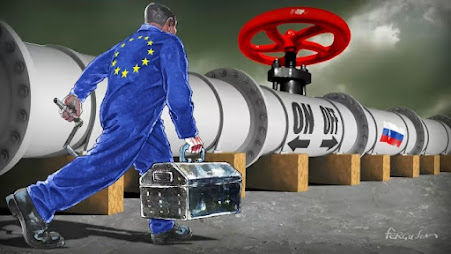EU Accuses Russia of using Gas supply as a weapon of war Gas prices jumped after Russia further cut gas supplies to Germany and other ...
EU Accuses Russia of using Gas supply as a weapon of war
Gas prices jumped after Russia further cut gas supplies to
Germany and other central European countries after threatening to earlier this
week.
Russia has been cutting flows through the Nord Stream 1
pipeline to Germany, with it now operating at less than a fifth of its normal
capacity.
Before the Ukraine War, Germany imported over half of its
gas from Russia and most of it came through Nord Stream 1 - with the rest
coming from land-based pipelines.
By the end of June, that had reduced to just over a quarter.
Russian energy firm Gazprom has sought to justify the latest
cut by saying it was needed to allow maintenance work on a turbine.
The German government, however, said there was no technical
reason for it to limit the supply.
Ukraine has accused Moscow of waging a "gas war"
against Europe and cutting supplies to inflict "terror" on people.
Meanwhile, Poland has said it will be fully independent from
Russian gas by the end of the year.
Prime Minister Mateusz Morawiecki said: "Even now,
Russia is no longer able to blackmail us in the way it blackmails Germany for
example."
The UK would not be directly impacted by gas supply
disruption, as it imports less than 5% of its gas from Russia. However, it
would be affected by prices rising in the global markets as demand in Europe
increases.
European wholesale gas prices closed at €204.85 (£172.08)
per megawatt hour - the third highest price on record. The all-time high was
achieved on 8 March when prices closed at €210.50 (£176.76) per megawatt hour,
according to analysts Icis.
However, this time last year the wholesale gas price in
Europe was at just above €37 (£31.08) per megawatt hour.
UK gas prices rose 7% on Wednesday so the price is now more
than six times higher than a year ago. However, it is still well below the peak
seen in the aftermath of Russia's invasion of Ukraine.
UK energy bills increased by an unprecedented £700 in April,
and are expected to rise again with one management consultancy warning a
typical energy bill could hit £3,850 a year by January, much higher than
forecasts earlier this month.
BFY said its forecast reflected the increase in wholesale
prices over the past few weeks with the ongoing tensions with Russia sparking
concerns over winter supplies.
The latest reduction in flows puts pressure on EU countries
to reduce their dependence on Russian gas even further, and will likely make it
more difficult for them to replenish their gas supplies ahead of winter.
Since the invasion of Ukraine European leaders have held
talks over how to reduce its dependence on Russian fossil fuels.
On Tuesday, the European Union agreed to cut gas use in case
Russia halts supplies but some countries will have exemptions to avoid
rationing.
EU members have now agreed to voluntarily reduce 15% of gas
use between August and March.
However, the deal was watered down after previously not
having exemptions.
The EU has said its aim from the deal is to make savings and
store gas ahead of winter, warning that Russia is "continuously using
energy supplies as a weapon".
The voluntary agreement would become mandatory if supplies
reach crisis levels.
The EU agreed in May to ban all Russian oil imports which
come in by sea by the end of this year, but a deal over gas bans has taken
longer.
Since Russia invaded Ukraine in February the price of
wholesale gas has already soared, with a knock-on impact on consumer energy
bills across the globe.
The Kremlin blames the price hike on Western sanctions,
insisting it is a reliable energy partner and not responsible for the recent
disruption to gas supplies.






No comments
Note: only a member of this blog may post a comment.